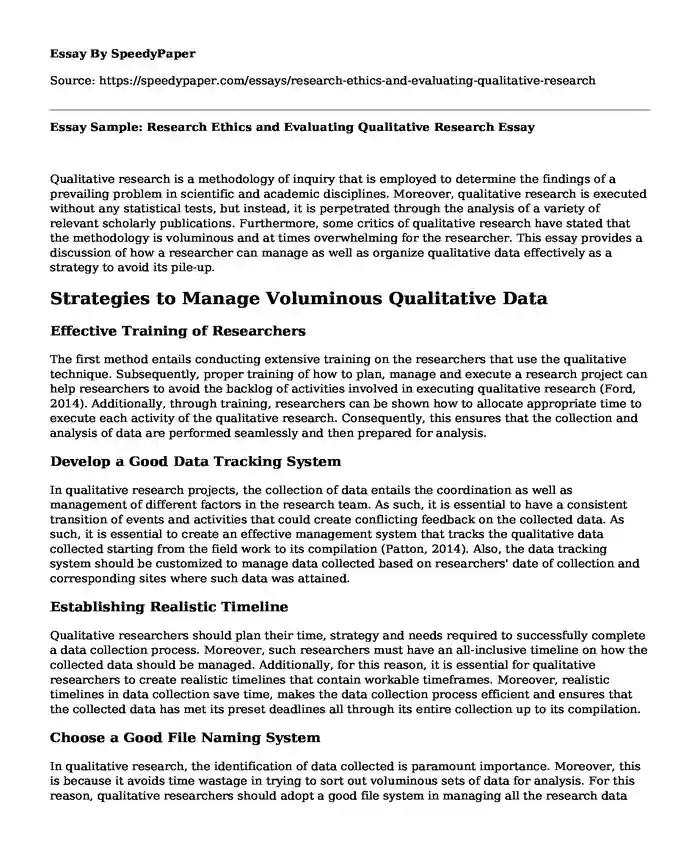Qualitative research is a methodology of inquiry that is employed to determine the findings of a prevailing problem in scientific and academic disciplines. Moreover, qualitative research is executed without any statistical tests, but instead, it is perpetrated through the analysis of a variety of relevant scholarly publications. Furthermore, some critics of qualitative research have stated that the methodology is voluminous and at times overwhelming for the researcher. This essay provides a discussion of how a researcher can manage as well as organize qualitative data effectively as a strategy to avoid its pile-up.
Strategies to Manage Voluminous Qualitative Data
Effective Training of Researchers
The first method entails conducting extensive training on the researchers that use the qualitative technique. Subsequently, proper training of how to plan, manage and execute a research project can help researchers to avoid the backlog of activities involved in executing qualitative research (Ford, 2014). Additionally, through training, researchers can be shown how to allocate appropriate time to execute each activity of the qualitative research. Consequently, this ensures that the collection and analysis of data are performed seamlessly and then prepared for analysis.
Develop a Good Data Tracking System
In qualitative research projects, the collection of data entails the coordination as well as management of different factors in the research team. As such, it is essential to have a consistent transition of events and activities that could create conflicting feedback on the collected data. As such, it is essential to create an effective management system that tracks the qualitative data collected starting from the field work to its compilation (Patton, 2014). Also, the data tracking system should be customized to manage data collected based on researchers' date of collection and corresponding sites where such data was attained.
Establishing Realistic Timeline
Qualitative researchers should plan their time, strategy and needs required to successfully complete a data collection process. Moreover, such researchers must have an all-inclusive timeline on how the collected data should be managed. Additionally, for this reason, it is essential for qualitative researchers to create realistic timelines that contain workable timeframes. Moreover, realistic timelines in data collection save time, makes the data collection process efficient and ensures that the collected data has met its preset deadlines all through its entire collection up to its compilation.
Choose a Good File Naming System
In qualitative research, the identification of data collected is paramount importance. Moreover, this is because it avoids time wastage in trying to sort out voluminous sets of data for analysis. For this reason, qualitative researchers should adopt a good file system in managing all the research data collected. Additionally, the file system must correctly identify and classify each set of data distinctively after the collection process. Furthermore, the naming of the data collected in qualitative research projects can be structured in numerical or alphabetical way. Subsequently, this makes locating specified data sets in the qualitative data compilations seamless and time-saving.
Conclusion
In conclusion, some critics of qualitative research have stated that the methodology is voluminous and at times overwhelming for the research. Nevertheless, this theory can be disapproved using efficient strategies of qualitative data collection. In this case, the strategies include effective training of researchers, developing a good data tracking system, establishing realistic timelines as well as choosing a good file naming system.
References
Ford, K. J. (2014). Improving Training Effectiveness in Work Organizations. London: Psychology Press.
Patton, M. Q. (2014). Qualitative Research & Evaluation Methods: Integrating Theory and Practice. Thousand Oaks: SAGE Publications.
Cite this page
Essay Sample: Research Ethics and Evaluating Qualitative Research. (2022, Mar 11). Retrieved from https://speedypaper.net/essays/research-ethics-and-evaluating-qualitative-research
Request Removal
If you are the original author of this essay and no longer wish to have it published on the SpeedyPaper website, please click below to request its removal:
- HRM Essay Example: Types of Training and Development Created
- Classical Conditioning and Operant Conditioning - Free Essay in Psychology
- Essay Sample about Qatar Plastic Products Company and Total Quality Management
- Free Essay Describing Iranian Revolution According to Michael Axworthy
- Free Essay: Is Nursing a Vocation or Profession
- Federalism in the United States - Essay Sample for Free Download
- Essay Sample on Why Healthcare Should be a Human Right
Popular categories





